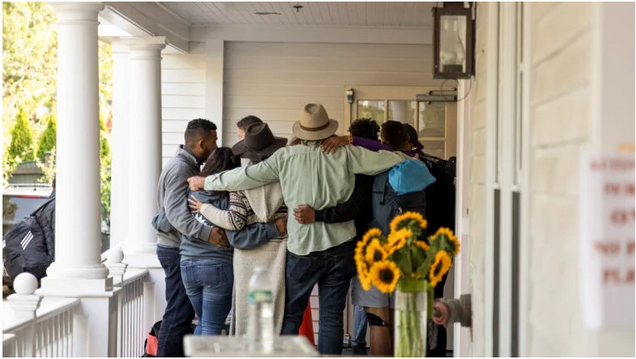After Meeting Five of the Migrants Sent to Martha’s Vineyard: Sanctuary and Hospitality by Carrie Preston

They couldn’t know they are famous as they stepped into our seminar room, where twelve students had gathered for a volunteer orientation with the resettlement agency and welcome dinner. They are not famous as individuals; they are among the more than seven million Venezuelans who have fled political disfunction and economic disaster in their country in search of safety and economic opportunities. They are among the nearly 200,000 Venezuelans who crossed the border in 2022, and asked for asylum, a legal act that is regularly and falseley described as illegal. They are five of the 49 migrants approached near a San Antonio, Texas shelter and lured by a brochure of false promises onto a jet chartered by Florida Governor Ron DeSantis (using over $600,000 in pandemic relief funds) and sent to the Massachusetts island resort of Martha’s Vineyard Migrants. They are famous because they happened to find themselves cast in a political theater described by DeSantis’s office as Florida’s “relocation program to transport illegal immigrants to sanctuary destinations” and perhaps inspired by Fox News personality Tucker Carlson, who suggested on July 26, 2022 that “huge numbers” of migrants should be sent to Martha’s Vineyard. They are survivors of a crime.
And in recounting the numbers and the political theatrics, I have, like so many writers, failed to acknowledge that they are human beings. They are a mother and father who journeyed from Venezuela with their twenty-year-old son. They are two other young men in their twenties who met on the perilous journey and helped each other survive, developing a visible and moving bond. They looked curious and a little uncertain as they joined our group of college students, a staff member from BU’s Center on Forced Displacement, the leader from the resettlement agency supporting them, and me. We ushered them to seats, introduced ourselves in whatever Spanish we had, and then disrupted the seminar circle, pushing the tables into a giant, mishappen dinner table. Everyone helped to carry heaping platters of food from a restaurant that touted its Venezuelan food. The students threw themselves into conversation, especially with the three young men who were not far from their age, in an enthusiastic but relaxed way. We made plans for students with excellent Spanish language skills to help them with interpretation and for small group outings, to visit Boston, maybe the zoo. But their most urgent need was to find work; they wanted help getting jobs.
I thought of the term “sanctuary” that had apparently been used to sell them on a free flight and was batted about by Carlson and the Florida governor’s office with derision. We had failed to provide sanctuary in Martha’s Vineyard and Boston. We had failed in our university seminar room, and we would fail in future efforts. The broken asylum and migration system makes sanctuary nearly impossible. But, we had connected as human beings and shared a meal. We had achieved hospitality.